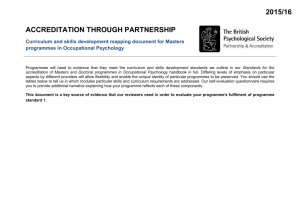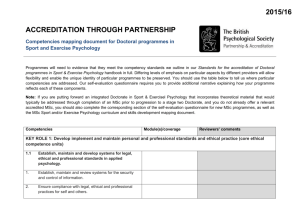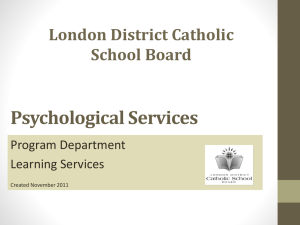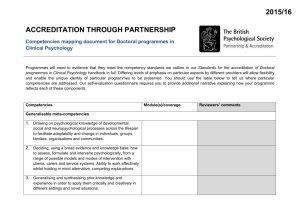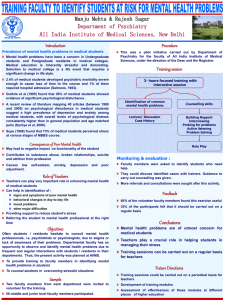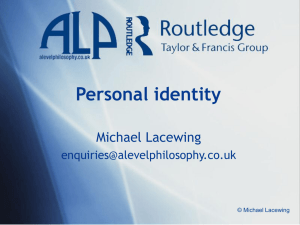Doctoral competencies mapping document
advertisement
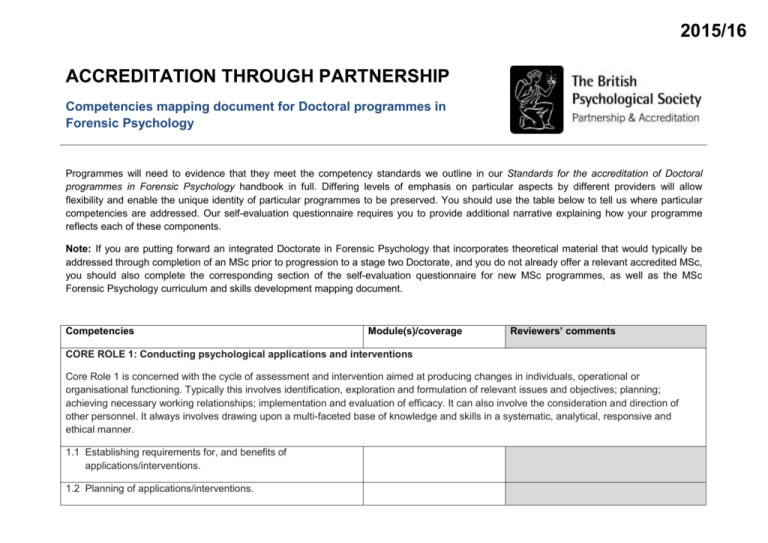
2015/16 ACCREDITATION THROUGH PARTNERSHIP Competencies mapping document for Doctoral programmes in Forensic Psychology Programmes will need to evidence that they meet the competency standards we outline in our Standards for the accreditation of Doctoral programmes in Forensic Psychology handbook in full. Differing levels of emphasis on particular aspects by different providers will allow flexibility and enable the unique identity of particular programmes to be preserved. You should use the table below to tell us where particular competencies are addressed. Our self-evaluation questionnaire requires you to provide additional narrative explaining how your programme reflects each of these components. Note: If you are putting forward an integrated Doctorate in Forensic Psychology that incorporates theoretical material that would typically be addressed through completion of an MSc prior to progression to a stage two Doctorate, and you do not already offer a relevant accredited MSc, you should also complete the corresponding section of the self-evaluation questionnaire for new MSc programmes, as well as the MSc Forensic Psychology curriculum and skills development mapping document. Competencies Module(s)/coverage Reviewers’ comments CORE ROLE 1: Conducting psychological applications and interventions Core Role 1 is concerned with the cycle of assessment and intervention aimed at producing changes in individuals, operational or organisational functioning. Typically this involves identification, exploration and formulation of relevant issues and objectives; planning; achieving necessary working relationships; implementation and evaluation of efficacy. It can also involve the consideration and direction of other personnel. It always involves drawing upon a multi-faceted base of knowledge and skills in a systematic, analytical, responsive and ethical manner. 1.1 Establishing requirements for, and benefits of applications/interventions. 1.2 Planning of applications/interventions. 1.3 Establishing, developing and maintaining working relationships. 1.4 Implementing applications/interventions. 1.5 Directing implementation of applications/interventions carried out by others. 1.6 Evaluating results of applications/interventions. CORE ROLE 2: Research Core Role 2 is concerned with the design, conduct, analysis and evaluation of applied psychological research in forensic settings. Typically this involves the generation of ideas for specific research, the formulation of testable research questions; the definition of parameters and resources required for research; the planning, preparation and design of psychological research investigations and the identification of appropriate research tools; negotiating for access and resources to conduct research; the collection of data; appropriate analysis of research data and appropriate interpretation and evaluation of results; the formulation of recommendations on the outcomes of research. It may involve co-operation and collaboration with other professionals at each stage of the research process. Note: The Society’s core requirement for all accredited Doctoral programmes is that trainees demonstrate the ability to conceptualise, design and conduct independent, original research of a quality to satisfy peer review, extend the forefront of the discipline, and merit publication. This should include the ability to: identify appropriate research questions; understand and reflect on ethical issues; choose appropriate research methods and approaches to analysis; report outcomes; and identify appropriate pathways for dissemination. 2.1 Designing psychological research activities. 2.2 Conducting research activities. 2.3 Analysing and evaluating psychological research data. CORE ROLE 3: Communicating psychological knowledge and advice to other professionals Core Role 3 is concerned with giving information, advice, guidance and feedback to personnel, agencies and organisations to enable effective problem-solving and decision-making, formulation and implementation of policy and practice. The emphasis is upon using appropriate communication skills to exert a constructive and psychologically based influence within current systems. It is this emphasis on communication 2 that distinguishes it from Key Role 1, although in practice these key roles are often complementary. Note: The Society’s core requirements for all accredited Doctoral programmes are that graduates: ● understand organisational and systemic issues of relevance to the practice of applied psychologists, including: ● understanding the organisational context for their practice; ● understanding the structures and functions of service providers applicable to the work of their profession; and ● understanding current legislation applicable to their work. ● recognise the role of other professionals and stakeholders of relevance to their work, including the role of service users, carers, and/or community groups; ● are able to adapt their practice to different organisational contexts for service delivery, as appropriate; ● are able to bring psychological influence to bear; for example, through consultancy, training, and working effectively in multidisciplinary and / or cross-professional teams. 3.1 Promoting awareness of the actual and potential contribution of applied psychological services. 3.2 Providing psychological advice to assist and inform problem solving and decision-making. 3.3 Providing psychological advice to aid the formulation of policy and its implementation. 3.4 Preparing and presenting evidence in formal settings. 3.5 Responding to informal requests for psychological information. 3.6 Providing feedback to clients 3.7 Understanding organisational and systemic issues of relevance to the practice of applied psychologists. CORE ROLE 4: Training other professionals in psychological skills and knowledge Core Role 4 is concerned with imparting to other professionals knowledge and skills where there is an important psychological component. In addition, many psychologists work in settings where improving job performance of other staff is a major part of their professional service. 4.1 Identifying and analysing needs to improve or prepare for job performance in specific areas. 3 4.2 Planning and design of training and development programmes. 4.3 Implementation of training and development programmes. 4.4 Planning and implementation of assessment procedures for evaluating training and development programmes. 4

